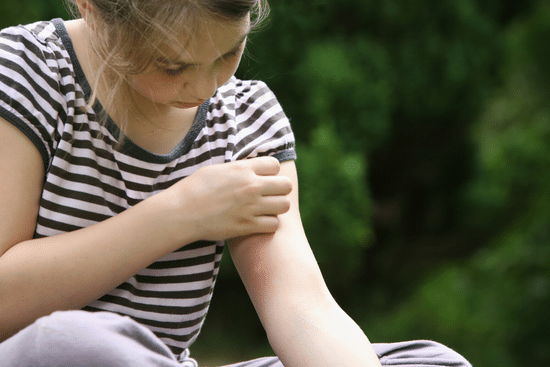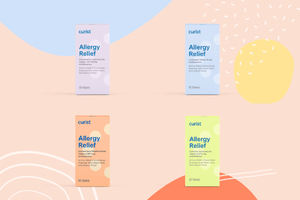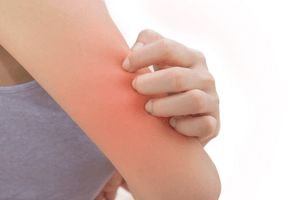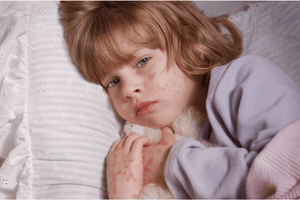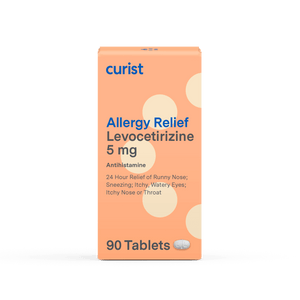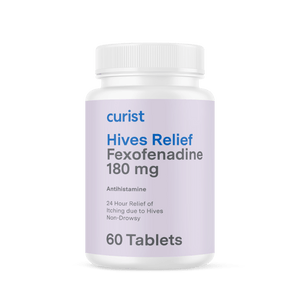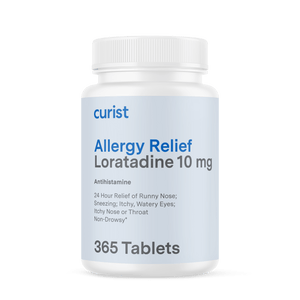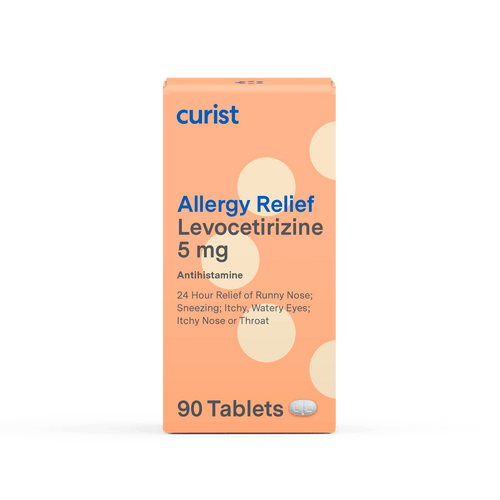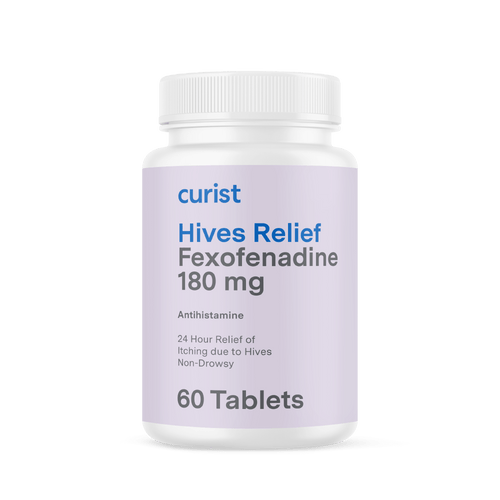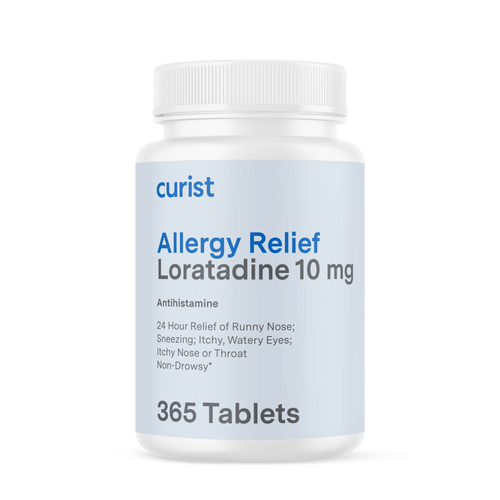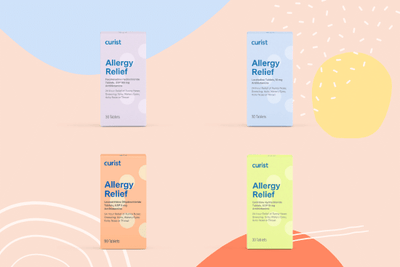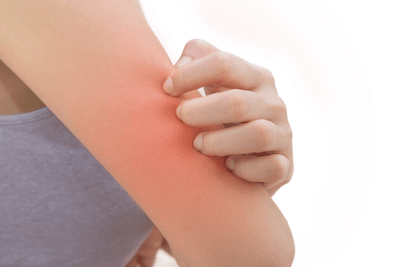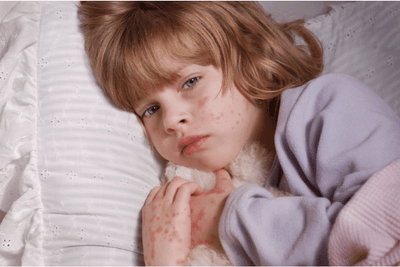Curist delivers over-the-counter medicines to your door at a fraction of the price of traditional brands. We hope everyone stays safe and healthy during this time.
During the fun summer months, it is nice to explore new places and venture to the great unknown. Have you ever returned from a hiking adventure only to discover little red bumps on your arms or legs? It can be hard to distinguish between normal bug bites, allergic bug bites, or something else, so let’s take a look at some of the differences and common ways to treat them.
How Do I Know If I Have Allergic Bug Bites? What Does a Bug Bite Allergy Look Like?
Most people who are stung or bitten by an insect experience some redness, itching, pain, or swelling only around the area of the bite. The bump may feel hard and itchy, and there could be several bug bites in the same area of skin. This is your body’s normal reaction to a bug bite and should get better over time. Within three to four days, the bug bite should change from pink or red to skin color, the need to itch will fade, and then within a week, the swelling should resolve.
However, if you have symptoms in parts of the body other than the area of the sting or bug bite, such as rash, hives, itchy throat, or swelling skin, it may be signs of an allergic bug bite. Usually, bug bites are no cause for alarm, but some may require medical attention. Certain insects can spread infections such as Lyme disease, Zika virus or Rocky Mountain spotted fever (RMSF).
What Insects Should I be Concerned About? Are Some Bug Bites More Serious than Others?
For smaller and more common insects like mosquitoes, your skin usually reacts to the bug bite within 12 hours by swelling a little, becoming pink or red, and feeling warm and itchy. Usually, these bug bites will go away on their own over a couple hours or days. In this scenario, try to avoid scratching the area as much as you can, because this can increase your risk of an infection if your hands or fingernails are not clean. Use hydrocortisone cream, calamine lotion, an oral antihistamine like levocetirizine (brand Curist), or a cold compress to help reduce the itchiness as you heal. Some people with “skeeter syndrome” may react severely to a mosquito bite with major swelling, blistering rashes, or bruises, but this is uncommon. If you have difficulty breathing or if symptoms feel more severe than normal, seek out a healthcare professional.
It is more likely that bigger insects with stingers or venom like wasps, yellow jackets, or bees, can cause an allergic reaction. If you get bitten on the arm or leg, it can cause severe swelling or hives on larger parts of your body, lasting up to a week. Fire ants’ stings can cause an elevated lesion called a pustule with surrounding swelling, redness, and itchiness. Rarely but occasionally, an insect sting can cause a severe, emergency allergic reaction called anaphylaxis, needing professional medical attention and treatment right away.
Do I Have Hives or Bug Bites? What is the Difference Between Bug Bites vs Hives?
Hives can be triggered by many things such as pollen, pet dander, plants, foods, medications, exercise, stress, infection, heat, or alcohol. It can be difficult to tell if you have hives or bug bites as they look similar to each other as red, itchy bumps; however, hives act differently than your typical bug bites.
Hives are raised, red or skin-colored bumps that turn white in the middle when you press down on them. They typically look like welts on the skin, larger than the size of a quarter across large areas on the body. These welts may disappear after a few hours, change shape, and/or reappear somewhere else on your body. In contrast, a bug bite will stay in the same place.
Acute hives usually resolve in 24 hours; however, they can be bothersome for up to six weeks. On the other hand, chronic hives can affect you over the course of months or years at random times. If you notice hives over the course of several days, you should visit your doctor or an allergy specialist to help identify the cause.
Especially if you have difficulty breathing, dizziness, or swelling inside the throat, tongue, eyes, or lips with hives, seek immediate medical attention as these can be signs of anaphylaxis, a serious life-threatening allergic reaction.
Do I Have an Itchy Rash or Bed Bugs?
If you are sleeping somewhere new and notice an itchy rash on your back, it could be due to a bedbug allergy. Usually these swollen bites are red with dark red centers and appear in a group or line on uncovered areas of skin such as your feet, hands, or neck. The best way to avoid bed bugs is to carefully inspect any bedding, sofas, chair cushions, and furniture at hotels or new lodgings. If you notice any bugs or question its cleanliness, try to avoid using it altogether. If the rash worsens with time, contact a healthcare provider immediately.
An itchy rash could also be a sign of an allergic reaction known as contact dermatitis. This rash usually occurs within minutes or hours of direct contact with an irritating substance or allergen, such as plants, detergents, medication, pollen, perfume, bleach, pesticides, or chemicals. If you suspect this is the case, wash your skin right away using mild, fragrance-free soap and warm water. Consider using a barrier cream or gel as a protective barrier. Taking an oral antihistamine like levocetirizine (brand Curist) or using an oatmeal bath can also reduce some symptoms. If the rash does not get better with time, worsens, or makes it difficult to breathe, seek immediate medical attention.
Do I Have Poison Ivy or Bug Bites?
The best way to avoid poison ivy and bug bites is to prevent being exposed to them. Avoid high grass and brushy areas, wear long protective clothing, tuck your pant legs into your sock, and use insect repellent before heading outdoors.
At sunrise and sunset, mosquitos are the most active. It can help to avoid wearing perfumes or strong scents as well as bright colors, since these can attract bugs to you while camping or hiking. Mosquitos breed in standing water such as rain gutters, water features, buckets, and toys so avoid these hot spots or take measures to clean or clear these things often.
Poison ivy, poison sumac, and poison oak are poisonous plants with oils that cause a red rash, blisters or itchy patches of skin. If possible, be aware of what these plants look like and if they are in your area to avoid them. If you suspect you have poison ivy, immediately wash your skin with lukewarm water, clean your clothes in hot water, and scrub under your fingernails to make sure the plant oils do not get in your eyes or move to other parts of your body. Applying an over-the-counter cortisone cream, calamine lotion or creams containing menthol to the area may help soothe the itchiness. If you have trouble sleeping, you may try taking an oral antihistamine like diphenhydramine (Benadryl), as some have found this helps with certain symptoms.
Do I Have Bug Bites or Eczema?
Eczema is more common in kids, but adults can also be affected. Generally, eczema will affect someone for much longer than a bug bite will last. Instead of the small pink or red bumps of a bug bite, eczema looks like red, brown, or gray dry, crusty patches of bumpy skin. Sometimes, the bumps will be filled with fluid, and become extremely itchy particularly at night. Try not to scratch these bumps, as they can become painful and infected without treatment. In this case, it is important to see your doctor to find the best medications to help manage your eczema.
Do I Have Allergies or Bug Bites?
Bug bites typically turn pink and swell a little bit in the same area. They will itch for a couple of hours or days, but should get better with time. You can use hydrocortisone cream on the bug bite to help avoid itching the area.
Allergies to a bug bite or sting can cause swelling, itching, and redness in areas other than the sting or bug bite. For example, your tongue or throat might start swelling, or you may have hives or a rash on another part of your body. If you find taking over-the-counter medications do not help, or if symptoms feel worse over the next couple hours, reach out to a healthcare provider to seek the best treatment.
Which is Better for Bug Bites: Benadryl or Hydrocortisone?
Both Benadryl (diphenhydramine) tablets and hydrocortisone creams can help with bug bites. Benadryl tablets are best taken before heading outdoors to prevent symptoms; however, it may be better to try a newer generation oral antihistamine such as Curist Allergy Relief (levocetirizine) if Benadryl makes you sleepy. If you are already bitten, try applying a cold compress to the affected area or 1% hydrocortisone cream to help relieve the itching.
What is the Best Antihistamine for an Insect Bite Allergy?
The best way to avoid bug bites is to prevent them using bug repellant sprays and wearing protective clothing such as long sleeve shirts or pants. However, if you have an insect bite allergy, using over-the-counter antihistamines such as Benadryl or Curist Allergy Relief (levocetirizine) can help reduce your redness, itching, and swelling symptoms.
Research has shown that taking oral antihistamines before or after a mosquito bite can help reduce the immediate swelling and itchiness in both kids and adults. So if possible, take an antihistamine such as levocetirizine (brand Curist), cetirizine, fexofenadine (Allegra), or loratadine (Claritin) a few hours prior to hiking or being outdoors for the best relief.
Taking an oral antihistamine while using topical hydrocortisone cream or calamine lotion can also help reduce symptoms and stop the urge to itch while your body recovers.
